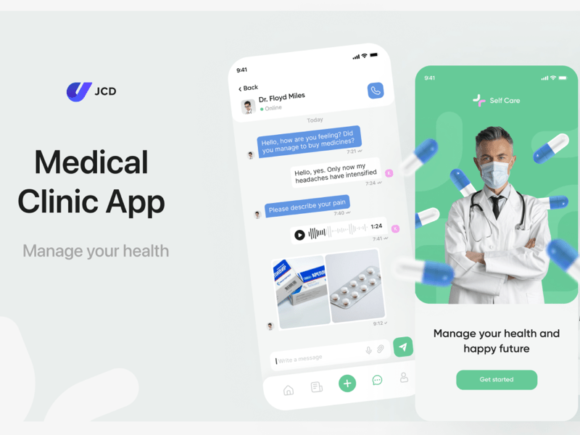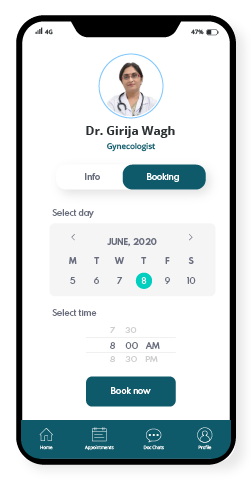The Advantages of Implementing a Mobile App for Clinics in Today's Healthcare
The Advantages of Implementing a Mobile App for Clinics in Today's Healthcare
Blog Article
The Future of Medical Care: Why Clinics Need a Mobile App Today
As the healthcare landscape continues to develop, centers encounter installing stress to adjust to individual expectations for better convenience and accessibility. The combination of mobile applications can serve as a crucial technique for improving patient involvement and improving procedures.
Transforming Person Assumptions
As the landscape of health care advances, client assumptions are going through a significant improvement. Today's patients are progressively looking for ease, availability, and individualized treatment.
In addition, people are coming to be a lot more informed and empowered, typically investigating conditions and therapies on-line prior to appointments. This heightened awareness is combined with a need for openness in medical care procedures, consisting of cost price quotes and treatment options. As an outcome, providers are compelled to adapt by embracing electronic tools that boost the individual experience.
The assumption for effective and prompt interaction has never ever been greater, with many clients taking into consideration responsiveness a crucial component of quality treatment. mobile app for clinics. In this developing landscape, medical care organizations should identify these transforming assumptions and utilize mobile applications to promote a more patient-centric technique, guaranteeing that they not only fulfill yet surpass the requirements set by today's informed customers
Enhancing Person Engagement

Mobile applications facilitate communication between individuals and medical care companies, making it possible for real-time appointment scheduling, reminders for medicine adherence, and direct messaging functions. These capabilities not just enhance benefit however also develop a feeling of liability amongst people. Mobile apps can provide educational content customized to specific demands, assisting patients much better comprehend their conditions and treatment options.
The combination of gamification elements within medical care apps can likewise inspire people to take part in healthy and balanced habits, strengthening positive lifestyle adjustments. By tracking development and fulfilling achievements, people are extra most likely to stay devoted to their wellness goals. Ultimately, enhancing patient interaction via mobile applications leads to enhanced wellness end results, better individual contentment, and a much more joint medical care experience. Centers that prioritize this facet will likely see a considerable effect on the top quality of treatment delivered.
Improving Clinic Procedures
Improving center procedures is necessary for boosting workflow effectiveness and optimizing individual treatment. The implementation of mobile applications can substantially reduce administrative problems, allowing doctor to concentrate a lot more on patient interactions. By automating appointment organizing, client check-ins, and billing processes, centers can reduce wait times and improve overall operational performance.
Mobile apps additionally facilitate real-time access to individual records, enabling health care specialists to make informed choices promptly. This immediacy not only improves the high quality of treatment yet our website likewise lowers the chance of mistakes linked with lost or outdated info. Moreover, leveraging mobile modern technology sustains an extra well organized approach to managing patient follow-ups and treatment strategies, ensuring that no essential actions are forgotten.
This permits for timely replenishment and helps stay clear of interruptions basics in client care due to equip scarcities. By integrating these capabilities right into their daily procedures, clinics can develop a more reliable and cohesive setting, ultimately leading to boosted individual outcomes and contentment.
Improving Communication Networks
Reliable communication is often mentioned as a keystone of high quality medical care distribution. In today's fast-paced medical atmosphere, mobile applications can dramatically boost communication networks in between facilities, clients, and healthcare service providers. By integrating mobile applications right into their operations, centers can promote real-time communications, guaranteeing that patients obtain prompt information regarding their consultations, test results, and treatment strategies.
Mobile apps likewise encourage individuals to communicate directly with their health care teams with protected messaging attributes. This straight line of interaction fosters a sense of involvement and enables instant clarification of issues, which can lead to better adherence to treatment procedures. In addition, push alerts can advise individuals of upcoming appointments or medicine timetables, lowering no-show rates and improving general health and wellness outcomes.

Staying Competitive in Medical Care
In a rapidly evolving health care landscape, companies should prioritize innovation and adaptability to preserve an affordable side. The assimilation of mobile applications into medical care solutions is no much longer optional; it is important for centers aiming to enhance patient involvement, improve procedures, and improve total solution distribution.
As clients increasingly count on digital systems for wellness monitoring, facilities that fail to take on mobile innovation danger falling back. A properly designed mobile application can use functions such as consultation scheduling, telemedicine assessments, and access to clinical documents, supplying clients with ease and fostering commitment.

Rivals are also purchasing mobile options, so remaining in advance requires continual improvement and remaining educated concerning technological innovations. Facilities must not just click to read execute mobile applications but also participate in regular updates and improvements. Eventually, the successful combination of mobile modern technology will differentiate forward-thinking medical care companies and established the standard for patient-centric treatment in a digital globe.
Conclusion
To conclude, the integration of mobile applications in facilities is imperative to deal with the advancing landscape of person assumptions. By enhancing person involvement, improving operations, and enhancing interaction channels, facilities can substantially enhance health and wellness results. Furthermore, the fostering of mobile modern technology positions clinics to stay affordable in a significantly digital healthcare atmosphere. Ultimately, the calculated implementation of mobile apps represents a crucial action towards delivering available and personalized health care, consequently meeting the demands these days's empowered individuals.
Eventually, improving individual interaction via mobile applications leads to boosted health and wellness outcomes, better individual contentment, and a much more joint medical care experience.Mobile apps also facilitate real-time accessibility to client documents, allowing medical care experts to make educated decisions swiftly. In today's fast-paced clinical environment, mobile applications can significantly improve communication networks between centers, individuals, and healthcare providers.Mobile apps additionally equip people to interact straight with their healthcare groups with secure messaging functions. Ultimately, the tactical execution of mobile apps stands for a crucial step towards providing personalized and accessible health care, thus meeting the demands of today's encouraged patients.
Report this page